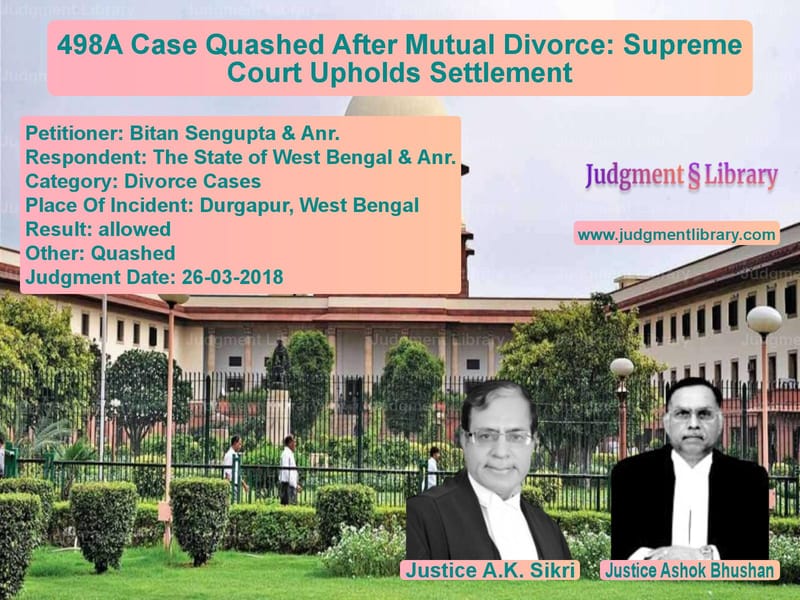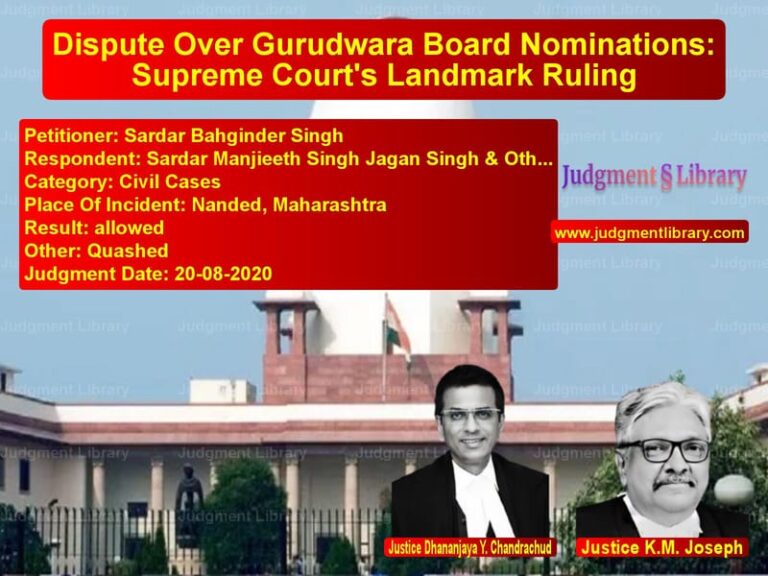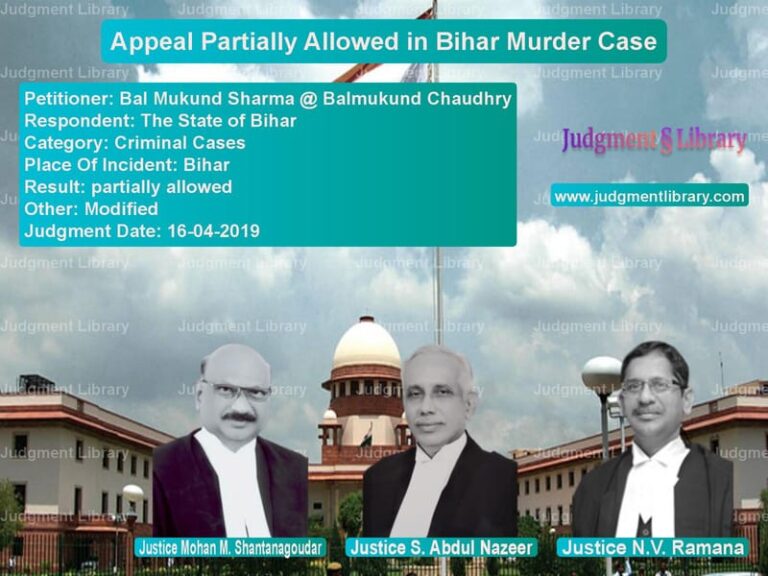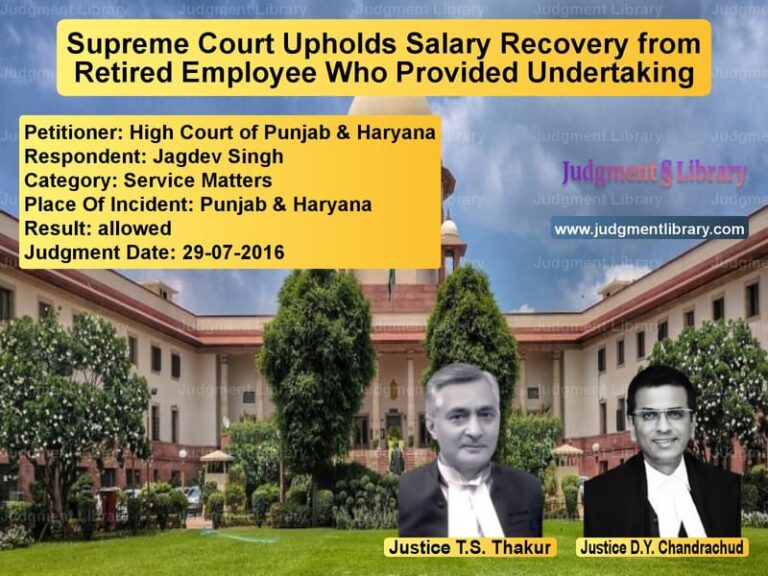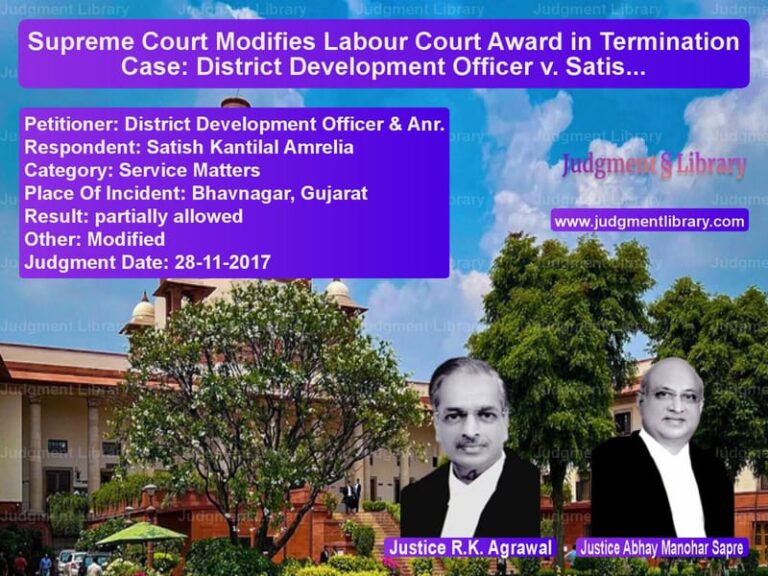498A Case Quashed After Mutual Divorce: Supreme Court Upholds Settlement
The Supreme Court of India, in the case of Bitan Sengupta & Anr. v. The State of West Bengal & Anr., examined whether a case under Section 498A of the Indian Penal Code (IPC) and the Dowry Prohibition Act, 1961 could be quashed based on a mutual settlement between the parties. The ruling highlights the importance of settlement in matrimonial disputes and the scope of judicial intervention in criminal proceedings involving married couples.
Background of the Case
The case originated from a dowry harassment complaint filed by respondent no. 2 (the wife) against her husband, Bitan Sengupta, and his family members. The complaint led to the registration of Case No. 554 PS Durgapur under Sections 498A, 406, and 506 of the IPC, along with Sections 3 and 4 of the Dowry Prohibition Act, 1961.
Following an investigation, a chargesheet was filed, and the Judicial Magistrate, through an order dated June 27, 2014, convicted the appellants under Section 498A IPC. The trial court sentenced:
- Appellant No. 1 (husband): One year of rigorous imprisonment.
- Appellant No. 2 (relative): Six months of simple imprisonment.
The appellants challenged their conviction before the Sessions Court, but their appeal was dismissed on September 21, 2016. They then filed a criminal revision petition before the High Court of Kolkata, which also upheld their conviction on September 12, 2017.
Mutual Settlement and Divorce
While the appeal was pending before the Sessions Court, the husband and wife arrived at a settlement. A Memorandum of Understanding (MOU) was signed on December 22, 2015, which led to a mutual divorce under Section 28 of the Special Marriage Act. The Additional District Judge, Durgapur, granted the divorce on April 4, 2016.
The wife confirmed in the settlement that she had no grievances against the appellants and wished for their acquittal. Both parties agreed not to initiate any further litigation against each other.
Key Legal Issues Before the Supreme Court
- Can a conviction under Section 498A IPC be quashed if the husband and wife settle the dispute?
- Does the settlement of matrimonial disputes allow the compounding of offenses under the Dowry Prohibition Act?
- Should the High Court have considered the settlement and quashed the case?
Arguments of the Parties
Petitioners’ (Husband and Relative’s) Arguments
- The dispute was matrimonial, and the parties had settled amicably.
- The wife, who was the complainant, no longer had any grievances.
- The High Court failed to consider the Supreme Court’s ruling in B.S. Joshi & Ors. v. State of Haryana & Anr., which allows quashing of criminal cases in matrimonial disputes if a settlement is reached.
Respondents’ (State and Wife’s) Arguments
- Section 498A IPC is a non-compoundable offense, and courts should be cautious before quashing such cases.
- Allowing quashing of 498A cases through settlement may weaken the law designed to protect women from cruelty.
- The conviction had already been upheld by the High Court, and setting it aside would send a wrong message.
Supreme Court’s Analysis and Judgment
The Supreme Court, comprising Justice A.K. Sikri and Justice Ashok Bhushan, examined the legal precedents and observed:
1. Application of B.S. Joshi & Ors. v. State of Haryana & Anr.
The Court referred to its landmark judgment in B.S. Joshi, where it had ruled that in matrimonial disputes, criminal proceedings can be quashed if the parties have amicably settled.
“If the parties have settled and want harmony between them, the court should allow compounding of offenses even if they are non-compoundable under the Code of Criminal Procedure.”
The Court held that the same principle should be applied in the present case.
2. Impact of Mutual Settlement
The Supreme Court noted that:
- The husband and wife had mutually agreed to divorce and settled all disputes.
- The wife had explicitly stated that she had no grievance against the appellants.
- Forcing the case to continue would serve no purpose as the complainant did not wish to pursue it.
The Court ruled:
“The High Court should have accepted the settlement and compounded the offenses. It is, more so, when the settlement between the parties, who were husband and wife, was even acted upon as the parties took mutual divorce on that basis.”
3. Conviction Set Aside
The Supreme Court found that continuing the prosecution would only cause unnecessary hardship to both parties. It quashed the conviction and allowed the appeal.
Final Judgment
The Supreme Court issued the following directives:
- The conviction of the appellants under Section 498A IPC was set aside.
- All criminal proceedings against them were quashed.
- The terms of the settlement were accepted, and both parties were free from further legal disputes.
Impact of the Judgment
This ruling reaffirms the Supreme Court’s stance that criminal cases arising from matrimonial disputes can be quashed if a genuine settlement is reached. The key takeaways are:
- Encouraging Amicable Resolutions: The judgment promotes the resolution of matrimonial disputes through mutual agreement rather than prolonged litigation.
- Balance Between Women’s Protection and Misuse of 498A: While 498A is meant to protect women from cruelty, the ruling prevents its misuse in cases where disputes are resolved amicably.
- Judicial Discretion in Quashing Non-Compoundable Offenses: The case sets a precedent for courts to quash cases under Section 498A IPC if settlement terms are fair and reasonable.
Conclusion
The Supreme Court’s ruling in Bitan Sengupta & Anr. v. The State of West Bengal & Anr. reinforces the importance of settlement in matrimonial disputes. By quashing the criminal case following a mutual divorce, the Court has provided clarity on how Section 498A IPC cases should be handled when the complainant and accused arrive at a genuine settlement.
Petitioner Name: Bitan Sengupta & Anr.Respondent Name: The State of West Bengal & Anr.Judgment By: Justice A.K. Sikri, Justice Ashok BhushanPlace Of Incident: Durgapur, West BengalJudgment Date: 26-03-2018
Don’t miss out on the full details! Download the complete judgment in PDF format below and gain valuable insights instantly!
Download Judgment: Bitan Sengupta & Anr vs The State of West Be Supreme Court of India Judgment Dated 26-03-2018.pdf
Direct Downlaod Judgment: Direct downlaod this Judgment
See all petitions in Dowry Cases
See all petitions in Mutual Consent Divorce
See all petitions in Domestic Violence
See all petitions in Judgment by A.K. Sikri
See all petitions in Judgment by Ashok Bhushan
See all petitions in allowed
See all petitions in Quashed
See all petitions in supreme court of India judgments March 2018
See all petitions in 2018 judgments
See all posts in Divorce Cases Category
See all allowed petitions in Divorce Cases Category
See all Dismissed petitions in Divorce Cases Category
See all partially allowed petitions in Divorce Cases Category

